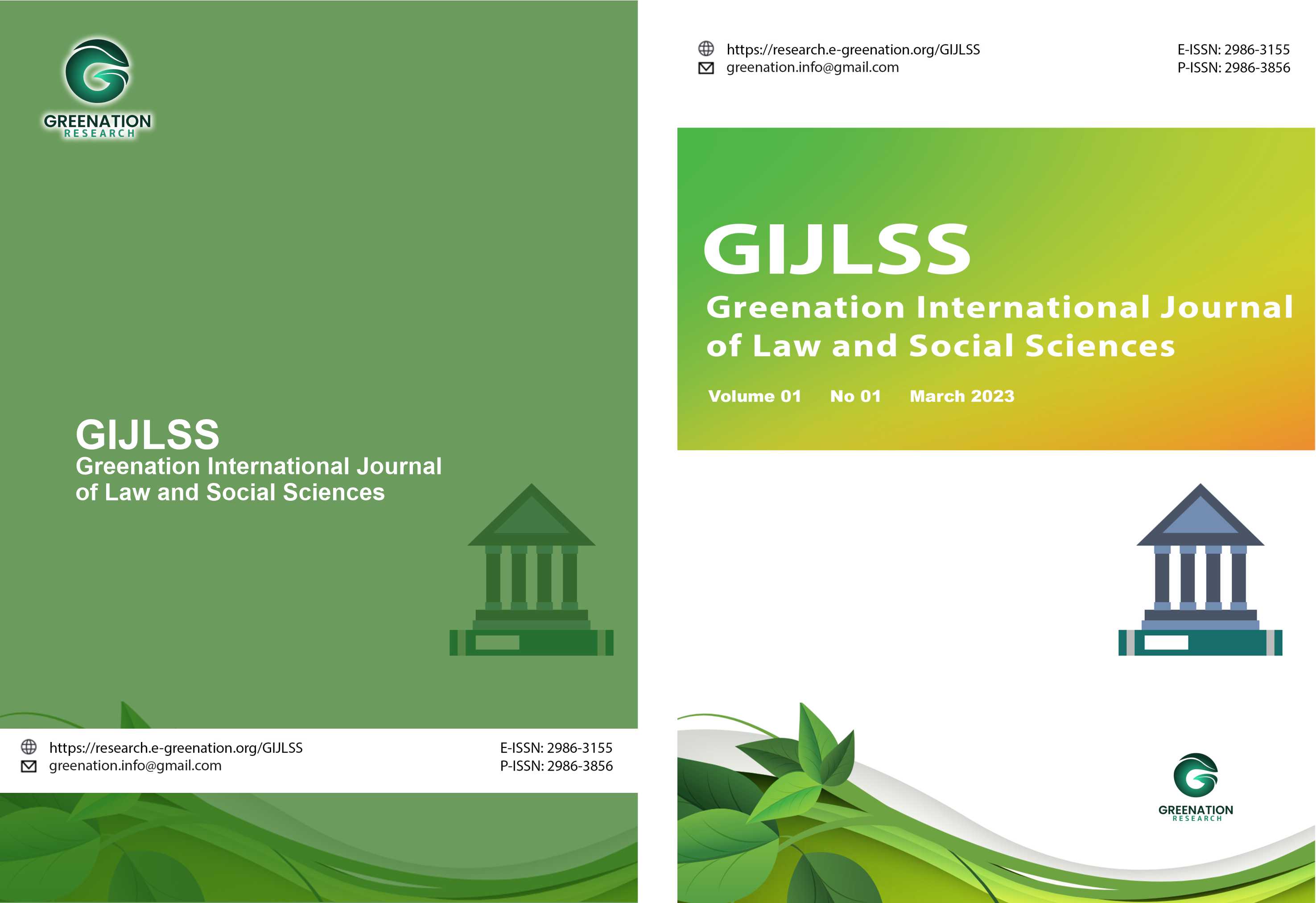Legal Benefits of the Use of Artificial Intelligence Technology in Resolution of Medical Disputes
DOI:
https://doi.org/10.38035/gijlss.v3i3.585Keywords:
Legal Benefits, Artificial Intelligence, MedicalAbstract
The demands of healthcare services, as stipulated in Law Number 17 of 2023 concerning Health, which demands excellent healthcare services, make the use of technological advances such as AI highly desirable. The healthcare sector, which utilizes AI, certainly assists in early disease detection, treatment planning, and telemedicine, thus facilitating healthcare services, including law enforcement in medical disputes. How beneficial is it legally to use artificial intelligence technology to settle medical disputes? That is the research's main concern. This study employs descriptive analysis and secondary data to conduct a normative legal analysis. The results show that the legal benefit of using artificial intelligence technology in resolving medical disputes is to facilitate research, data collection, and information processing quickly and accurately. Therefore, the use of AI calculations will eliminate the potential for suspicion from litigants or the public and make the judges' decisions more objective. Thus, the position of AI is not as a decision-maker, but is limited to recommendations from the analysis results. Therefore, in an effort to create legal certainty regarding the use of AI technology in resolving medical disputes, it is necessary to immediately issue legislation on resolving medical disputes that utilize information and communication technology by involving the active role of the community in creating the legislation.
References
Aburaera, S. (2013). Filsafat Hukum: Teori dan Praktek, Edisi Pertama. In Cet. IV.
Amriani, N. (2011). Mediasi: Alternatif Penyelesaian Sengketa Perdata di Pengadilan. RajaGrafindo Persada.
Angkasa. (2010). Filsafat Hukum. Universitas Jenderal Soedirman.
Bhora, D., & Shravan, K. (2019). DEMYSTIFYING THE ROLE OF ARTIFICIAL INTELLIGENCE IN LEGAL PRACTICE. Nirma University Law Journal, 8, 3. https://ssrn.com/abstract=3443000
Boulle, L. (2005). Mediation: Principles, Process, Practice. In Law papers. LexisNexis Butterworths.
Halim, A. R. (2005). Pengantar Ilmu Hukum Dalam Tanya Jawab. Ghalia Indonesia.
Haris, M. T. A. R., & Tantimin, T. (2022). ANALISIS PERTANGGUNGJAWABAN HUKUM PIDANA TERHADAP PEMANFAATAN ARTIFICIAL INTELLIGENCE DI INDONESIA. Jurnal Komunikasi Hukum (JKH), 8(1), 307–316. https://doi.org/10.23887/jkh.v8i1.44408
Hatta, Moh. (2013). Hukum Kesehatan dan Sengketa Medik. Liberty.
I. W., W., & Zaimatuddunia, I. (2023). Logika Hukum dalam Bidang Kedokteran. COMSERVA Indonesian Jurnal of Community Services and Development, 2(11), 2754–2759. https://doi.org/10.59141/comserva.v2i11.664
Kurniawijaya, A., Yudityastri, A., & Zuama, A. P. C. (2021). Pendayagunaan Artificial intelligence dalam Perancangan Kontrak serta Dampaknya Bagi Sektor Hukum di Indonesia. Khatulistiwa Law Review, 2(1), 260–279.
Lathif, N. (2017). TEORI HUKUM SEBAGAI SARANA ALAT UNTUK MEMPERBAHARUI ATAU MEREKAYASA MASYARAKAT. PALAR (Pakuan Law Review), 3(1), 64. https://doi.org/10.33751/palar.v3i1.402
Muhlis, S. R., Nambung, I., & Alwy, S. (2020). Kekuatan Hukum Penyelesaian Sengketa Medik Pasien dengan Rumah Sakit Melalui Jalur Mediasi. Jurnal Ilmiah Dunia Hukum, 5(1), 31–40.
Pakpahan, R. (2021). Analisa Pengaruh Implementasi Artificial Intelligence Dalam Kehidupan Manusia. Journal of Information System, Informatics and Computing, 5(2), 506–513.
Ratman, D. (2014). Seri Hukum Kesehatan: Mediasi Non Litigasi Terhadap Sengketa Medik Dengan Konsep Win-Win Solution. Elex Media Komputindo. https://books.google.co.id/books?id=tRVQDwAAQBAJ
Ricky. (2020). Aspek Hukum Peraktik Kedokteran Melakukan Tindakan Medis yang Bukan Kewenangan Kompetensi Profesinya. Jurnal Lex Renaissance, 5(2), 405. https://doi.org/10.20885/JLR.vol5.iss2.art10
Santoso, A. D., Isharyanto, & Sulistiyono, A. (2019). PENYELESAIAN SENGKETA MEDIK MELALUI MEDIASI OLEH MAJELIS KEHORMATAN DISIPLIN KEDOKTERAN INDONESIA (MKDKI) UNTUK DAPAT MENJAMIN KEADILAN DALAM HUBUNGAN DOKTER DAN PASIEN. Jurnal Hukum Dan Pembangunan Ekonomi, 7(1), 29. https://doi.org/10.20961/hpe.v7i1.29176
Sebayang, E. K., Mulyadi, M., & Ekaputra, M. (2024). Potensi Pemanfaatan Teknologi Artificial Intelligence Sebagai Produk Lembaga Peradilan Pidana di Indonesia. Locus Journal of Academic Literature Review, 3(4), 317–328. https://doi.org/10.56128/ljoalr.v3i4.311
Sinaga, N. A. (2021). Penyelesaian Sengketa Medis di Indonesia. Jurnal Ilmiah Hukum Dirgantara, 11(2), 2.
Soekanto, S., & Mamudji, S. (2007). Penelitian Hukum Normatif?: Suatu Tinjauan Singkat. Rajawali Pers.
Supadmo, D., & Prasetyo, H. (2024). Peran Organisasi Profesi Kedokteran dalam Menyelesaikan Sengketa Medis. Jurnal Global Ilmiah, 1(10), 489. https://doi.org/10.55324/jgi.v1i10.97
Tambe, A. W., Nasution, A., & Almadea, N. F. (2025). Keterlibatan Artificial Intelligence sebagai Katalisator Perancangan Putusan Perkara Perdata di Indonesia. Federalisme: Jurnal Kajian Hukum Dan Ilmu Komunikasi, 2(2), 01–14. https://doi.org/10.62383/federalisme.v2i2.568
Tjahyanti, L. P. A. S., Saputra, P. S., & Santo Gitakarma, M. (2022). Peran Artificial Intelligence (AI) Untuk Mendukung Pembelajaran Di Masa Pandemi Covid-19. Komteks, 1(1), 16.
Wangol, W. A. (2016). Asas Peradilan Sederhana Cepat Dan Biaya Ringan Dalam Penyelesaian Perkara Pidana Menurut Kuhap. Lex Privatum, 4(7), 39.
Wiguna, G. N. B. P., Pidada, I. B. G. S. P., & Basworo, W. (2025). Strategi Antisipasi Sengketa Medis Pada Pelayanan di Rumah Sakit. Medika Alkhairaat: Jurnal Penelitian Kedokteran Dan Kesehatan, 7(01), 805–811.
Zahra, H. M., & Marpaung, D. S. H. (2022). Penyelesaian Sengketa Medik Melalui Arternatif Penyelesaian Sengketa Mediasi. Jurnal Justitia: Jurnal Ilmu Hukum Dan Humaniora, 9(2), 889–897.
Zakir, M. H., Khan, S. H., Tanoli, K., Saeed, Z., & Sajida. (2023). The Impact of Artificial Intelligence on Intellectual Property Rights. International Journal of Human and Society (IJHS), 3, 312–319.
Downloads
Published
How to Cite
Issue
Section
License
Copyright (c) 2025 Hadi Zulkarnain, Ahmad Redi

This work is licensed under a Creative Commons Attribution 4.0 International License.
Copyright :
Authors who publish their manuscripts in this journal agree to the following conditions:
- Copyright in each article belongs to the author.
- The author acknowledges that the Greenation International Journal of Law and Social Sciences (GIJLSS) has the right to be the first to publish under a Creative Commons Attribution 4.0 International license (Attribution 4.0 International CC BY 4.0).
- Authors can submit articles separately, arrange the non-exclusive distribution of manuscripts that have been published in this journal to other versions (for example, sent to the author's institutional repository, publication in a book, etc.), by acknowledging that the manuscript has been published for the first time at GIJLSS.























